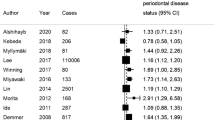Abstract
Design Systematic review and meta-analysis.
Data sources A search of two databases, Medline and CENTRAL, was undertaken, limited to articles published in English from the oldest records until 10 July 2018.
Study selection Participants included patients diagnosed with type 2 diabetes and periodontitis, with HbA1c and C-reactive protein (CRP) measurements at baseline. The intervention was surgical or non-surgical periodontal therapy. The control was no periodontal treatment, supra-gingival scaling or oral hygiene instruction. The outcome was HbA1c and CRP measurements three months later.
Data extraction and synthesis Two independent reviewers assessed articles initially by title and abstract, before reviewing full texts of relevant studies. Disagreements were resolved through discussion or a third reviewer. Data extraction included definition of periodontal disease, periodontal intervention and average changes in HbA1c and CRP. Risk of bias was assessed using the Cochrane Collaboration tool. Two meta-analyses were performed to determine the effects of periodontal intervention on HbA1c and CRP.
Results Out of 402 potential studies, nine randomised controlled trials were included. Six studies had no periodontal treatment reported in the control arm, whereas oral hygiene instruction or supra-gingival scaling was described in three studies. The intervention in all studies was non-surgical periodontal treatment, but one also involved surgical debridement. No heterogeneity was detected using the Cochrane Q test or I2 statistic. The majority of studies were deemed to be at high risk of performance bias due to a lack of blinding of participants. The results of the meta-analyses indicated a significant reduction in percentage of HbA1c (difference in means = 0.56, 95% CI [0.36-0.75], p <0.00001) and in CRP levels (difference in means = 1.89, 95% CI [1.70-2.98], p <0.00001).
Conclusions Periodontal treatment improves metabolic control as well as reduces systemic inflammation in patients with type 2 diabetes.
This is a preview of subscription content, access via your institution
Access options
Subscribe to this journal
Receive 4 print issues and online access
$259.00 per year
only $64.75 per issue
Buy this article
- Purchase on Springer Link
- Instant access to full article PDF
Prices may be subject to local taxes which are calculated during checkout
Similar content being viewed by others
References
Hasuike A, Iguchi S, Suzuki D, Kawano E, Sato S. Systematic review and assessment of systematic reviews examining the effect of periodontal treatment on glycaemic control in patients with diabetes. Med Oral Patol Oral Cir Bucal 2017; DOI: 10.4317/medoral.21555.
Baeza M, Morales A, Cisterna C et al. Effect of periodontal treatment in patients with periodontitis and diabetes: systematic review and meta-analysis. J Appl Oral Sci 2020; DOI: 10.1590/1678-7757-2019-0248.
Engebretson S, Kocher T. Evidence that periodontal treatment improves diabetes outcomes: a systematic review and meta-analysis. J Periodontol 2013; 84(4 Suppl): S153-169.
Author information
Authors and Affiliations
Rights and permissions
About this article
Cite this article
Shelswell, J. Does periodontal treatment have an impact on metabolic control and systemic inflammation in patients with type 2 diabetes?. Evid Based Dent 22, 40–41 (2021). https://doi.org/10.1038/s41432-021-0156-4
Published:
Issue Date:
DOI: https://doi.org/10.1038/s41432-021-0156-4



